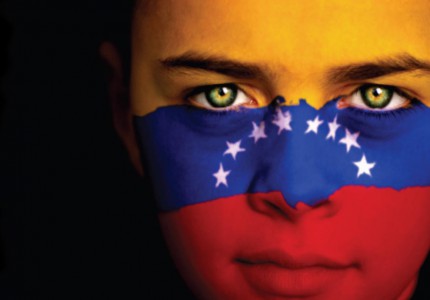Nathan Crooks for Bloomberg

Venezuela, the country known for long food lines and shortages of toilet paper and deodorant, can be a paradox at times. Specialty food stores in Caracas are well stocked with delicacies including imported lamb chops, smoked salmon and caviar.
For those with U.S. dollars, those luxuries are relatively cheap, too. Yet most Venezuelans can’t afford the greenback. Residents depend on local salaries paid in bolivars, the national currency which has declined 97 percent in the past three years. At the current black market exchange rate, 100 bolivars, the country’s biggest bill, is only worth 36 U.S. cents.
Venezuela has maintained strict currency controls since 2003 and currently has three legal exchange rates. The government sells dollars for 6.3, 12 and 177 bolivars. The first two rates are used for imports of government-authorized priority goods including food, medicine and car parts. The third rate, introduced on Feb. 12, can be used by anyone who doesn’t receive authorization to buy dollars at the first two preferential rates.
Venezuela’s minimum wage, which many workers receive, has tripled in local currency in the past three years to about 5,600 bolivars today. That hasn’t kept up with a dramatic slump in the bolivar’s value against the U.S. dollar in the same period. The government has devalued its primary exchange rate once and introduced three weaker alternative rates. Using the weakest legal exchange rate, the minimum wage has tumbled from about $360 a month in 2012 to $31 a month today.
On the black market, where people and businesses turn when they can’t obtain government approval to purchase dollars at the three legal rates, one dollar currently buys about 280 bolivars. The currency has fallen 38 percent on the black market this year alone, pushing the minimum wage down to about $20 a month. That’s on par with Ethiopia and well behind regional peers including Colombia and Brazil, according to WageIndicator.org data.
Professionals don’t fare much better. A school teacher with 25 years of experience made 9,786 bolivars a month in 2014. That’s about $35 a month at the current black market exchange rate, which won’t even buy a used television.
The black market rate has become an important reference, and many luxury and non-essential goods are priced using it. A bottle of olive oil at an upscale grocery store, for example, can cost well more than half the salary of a minimum-wage worker. Most Venezuelans can’t afford it and have to depend on government-run markets and stores that sell essential goods at the regulated, cheap prices. That’s why the country is seeing food lines stretching for multiple blocks.
And groceries at these state-subsidized prices are still too expensive for many. A packet of precooked cornmeal, a Venezuelan staple, sells for 19 bolivars at these state-run stores. That’s 7 cents using the black market rate, which doesn’t sound like a lot, but still amounts to about a half-hour of pay for someone who makes the minimum wage. A standard basket of food to feed the typical Venezuelan family for a month cost 6,382 bolivars in November, the last month the government reported figures. That means it took 1.5 minimum wage salaries just to feed a family, let alone do anything else.
About one quarter of Venezuelan workers don’t even make minimum wage, according to Lissette Gonzalez, a sociologist at the Andres Bello Catholic University in Caracas.
“If people earn very little there is no other option except standing in line and waiting as long as it takes to get what they need at the regulated price,” she said in a telephone interview. “Very few Venezuelans earn dollars.”
With the world’s fastest rate of inflation eating away at Venezuelans’ earnings and savings, the country is quickly becoming a dual economy. Those who have dollars can live like kings. Everyone else waits in line for subsidized, and scarce, regulated goods. A new 2015 Toyota Corolla is being advertised as starting at 1.6 million bolivars. That’s only about $6,000 at the black market rate. It’s also 24 years of work being paid at the minimum wage.
Easy if you have dollars. An impossibility if, like most, you don’t.
Bron: Bloomberg

